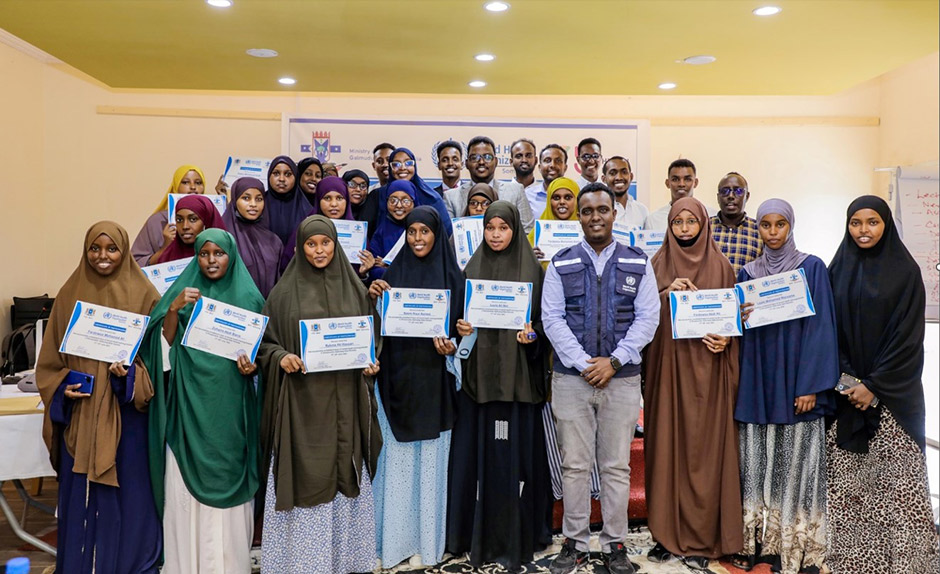 A group of health professionals trained on mental health and psychosocial support in Dhusamareb, Galmudug State. Photo credit: WHO Somalia/A. Mohamud
A group of health professionals trained on mental health and psychosocial support in Dhusamareb, Galmudug State. Photo credit: WHO Somalia/A. Mohamud
10 October 2023, Mogadishu, Somalia – The World Health Organization (WHO) Somalia Country Office is supporting the Federal Ministry of Health and Human Services to observe the World Mental Health Day 2023. This year’s theme- w “Mental health is a universal human right” is a stark reminder that in a country frequently affected by conflict and crisis and having a high burden of mental health disorder, everyone, everywhere suffering from mental health illness has the right to seek and receive quality mental health care. Multiple events are being run in parallel in Mogadishu and in capital cities of Somalia’s federal member states under the slogan “Our minds, our rights”.
WHO estimates that 10% of people worldwide experience mental health issues. This figure may rise to as much as 20% in countries that are prone to war and conflict, such as Somalia, where violence has infiltrated every aspect of society. Mental health conditions also affect a growing number of adolescents and young people. In one of the recent studies carried out jointly by WHO, the Somali National University and the Federal Ministry of Health amongst 713 people (age range between 25 to 56 years) and conducted in three districts, it was found out that the prevalence of mental disorders was high (76.9%) as well as substance use disorders (50.6%). This shows that the young people in suffer from higher burden of mental health illness than was previously estimated.
WHO advocates for mental health as a basic human right for all by promoting the idea that everyone, whoever and wherever they are, has the right to the highest attainable standard of mental health. This includes the right to be protected from mental health risks; the right to available, accessible, acceptable and good quality care; and the right to liberty, independence and inclusion in the community.
WHO continues to support the Federal Ministry of Health and Human Services and local partners to ensure that mental health is valued, promoted and protected, and that urgent action is taken so that everyone can exercise their human rights and access the quality mental health care they need. This includes efforts to strengthen an integrated, multisectoral response through evidence-based and achievable plans that promote the identification, prevention, treatment and rehabilitation of mental and neurological disorders, with respect for human rights and social protection. This approach aligns with both Somalia’s Essential Package of Health Services (EPHS) 2020 and WHO’s Mental Health Gap Action Programme.
“Only an estimated 5% of people with mental disorders contact psychiatric professionals owing to cultural stigma associated with mental illness in Somalia. Therefore, much more work is needed to understand the overall burden of mental disorders in the country and make basic, good quality mental health care widely available,” observed the Dr Mahmud, Director of Hudur Hospital.
In June and July 2023, WHO supported the Federal Ministry of Health and Human Services to train 50 health professionals in the regional hospitals of Hudur, South West State, and Dhusamareb, Galmudug State. It also helped the state ministries to develop an operational referral system for tertiary health care facilities, which will connect communities with the available mental health and psychosocial support services (MHPSS). By August, the newly trained workforce had begun to administer services at their respective health facilities, thus expanding the network of mental health care in the 2 regions.
“The training was a crucial part of integrating mental health into primary health care and is beneficial for health professionals, but a lot still needs to be done to raise awareness among local communities to help reduce the stigma associated with mental illness. Fewer people are being chained, but even now, very few people opt to consult the available practitioners owing to societal pressures. We need to address this hesitation, especially among the younger generation,” summarized Dr Saed of Dhusamareb Hospital, who attended the WHO-administered training on MHPSS.
WHO-supported trainings are helping to expand and enrich the network of MHPSS professionals in Somalia. In the longer term, the plan is to establish institutional training up to the level of a psychology degree course. WHO continues to work with its partners to mobilize the necessary resources to realize this long-term plan.
For more information, please contact:
Fouzia Bano
Communications Officer,
WHO Somalia Country
OfficeEmail:
This e-mail address is being protected from spambots. You need JavaScript enabled to view it
Related links:



